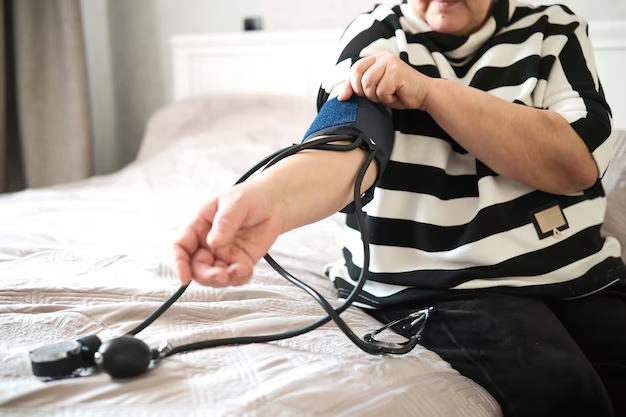Your Guide to How Can You Get Hypertension
What You Get:
Free Guide
Free, helpful information about HyperTension FAQ and related How Can You Get Hypertension topics.
Helpful Information
Get clear and easy-to-understand details about How Can You Get Hypertension topics and resources.
Personalized Offers
Answer a few optional questions to receive offers or information related to HyperTension FAQ. The survey is optional and not required to access your free guide.
Understanding Hypertension: Are You at Risk?
If you've ever wondered how hypertension develops, you're not alone. Hypertension, or high blood pressure, is a common condition that can sneak up on you without any obvious symptoms. It's often dubbed the "silent killer" due to its stealthy nature but understanding its causes can empower you to take preventive action.
What Causes Hypertension?
Hypertension develops from a combination of factors—some within your control, others not. Here's what you need to know:
Genetics and Family History
Your genes can play a significant role in how likely you are to develop high blood pressure. If hypertension runs in your family, your odds increase. While you can't change your genetics, being aware of your family history allows you to be more vigilant about other controllable factors.
Lifestyle Choices
The modern lifestyle can be a breeding ground for hypertension. Here are a few lifestyle habits that contribute to high blood pressure:
Diet: Consuming a diet high in salt, saturated fats, and cholesterol can elevate blood pressure. A balanced diet rich in fruits, vegetables, whole grains, and lean proteins can lower your risk.
Physical Inactivity: A sedentary lifestyle contributes to weight gain, a key factor in developing hypertension. Regular exercise helps maintain a healthy weight and keeps blood pressure in check.
Smoking and Alcohol: Both habits can damage your heart and blood vessels, contributing to high blood pressure. Reducing or eliminating these habits can significantly lower your risk.
Chronic Conditions
Certain chronic conditions can increase the likelihood of developing hypertension. These include:
Diabetes: There's a strong link between diabetes and hypertension. Managing blood sugar can help control blood pressure levels.
Kidney Disease: Your kidneys play a critical role in regulating blood pressure. Disorders affecting them can lead to hypertension.
Age and Sex
As you age, the risk of hypertension increases due to changes in your blood vessels and hormonal fluctuations. While men are generally at higher risk at younger ages, women catch up and surpass men post-menopause.
Tackling Hypertension Financially
Once diagnosed with hypertension, managing the condition often involves medication and regular doctor visits, which can be costly. However, there are financial assistance options available:
Government Aid Programs
Many governments offer healthcare programs that help cover medication and doctor visits for chronic conditions like hypertension. Investigate what local, state, or federal assistance might be accessible for you.
Insurance Plans
Review your health insurance plan's provisions regarding chronic illness management. Some policies cover more costs than others, making it essential to understand your policy's fine print.
Debt Relief Options
Medical debt is a real concern for many managing chronic diseases. Consider debt relief options or speak with a financial advisor to understand how to better balance healthcare costs with your financial health.
Educational Grants
For those studying healthcare or public policy, educational grants can help alleviate the burden of tuition fees. These grants allow students to focus on their studies and, potentially, contribute solutions to public health issues like hypertension.
Realizing the financial implications of managing hypertension can seem daunting, but numerous resources exist to provide aid and guidance. Whether it's through direct financial assistance or more supportive educational avenues, knowing where to turn for help can make living a healthy, well-balanced life entirely feasible.
Quick Financial Assistance Resources
- 🏥 Government Aid Programs: Medicare, Medicaid, and other state-run healthcare initiatives.
- 📈 Insurance Plans: Review your policy for chronic condition coverage.
- 💳 Debt Relief Options: Consult a financial advisor for personalized advice.
- 🎓 Educational Grants: Look into scholarships for healthcare-related fields.
By taking proactive steps and understanding your options, you can manage hypertension effectively while safeguarding your financial health.
What You Get:
Free HyperTension FAQ Guide
Free, helpful information about How Can You Get Hypertension and related resources.

Helpful Information
Get clear, easy-to-understand details about How Can You Get Hypertension topics.

Optional Personalized Offers
Answer a few optional questions to see offers or information related to HyperTension FAQ. Participation is not required to get your free guide.


Discover More
- a 66 Year Old Female With a History Of Hypertension
- Are Eggs Bad For Hypertension
- Are Eggs Good For Hypertension
- Are Endocrine Disorders Causing Hypertension Rare
- Can Adderall Cause Hypertension
- Can Alcohol Cause Hypertension
- Can Allergies Cause Hypertension
- Can Anemci People Get Hypertension
- Can Anemia Cause Hypertension
- Can Antibiotics Cause Hypertension
